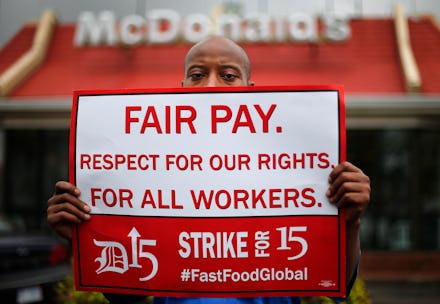The Biggest Food Strike in History Is Happening Today

The news: Thursday will mark the largest fast food strike ever, spreading far beyond U.S. borders. Organizers expect to rally in more than 150 U.S. cities and in cities in over 30 different countries. Fast Food Forward, a New York-based labor group, and the International Union of Food, Agricultural, Hotel, Restaurant, Catering, Tobacco and Allied Workers' Association (IUF) have joined forces to help orchestrate the fast food employee walk-off. The goal of a global call to action is to usher in change, so that this $200 billion industry stops exploiting their employees with low wages and preventing them from unionizing.
The fast food industry may have not listened to its employees' complaints before, but with the world watching, they may have to now.
In the U.S., fast food workers are lobbying for higher wages. Currently many employees are paid the federal minimum wage of $7.25 an hour, but are hoping that after Thursday's protests, hourly rates will increase to $15 per hour. Many full-time employees at McDonald's, Burger King and Wendy's work to support themselves and their household from their wages. CNN Money reports that the median fast food worker makes slightly more than minimum wage at $9 an hour, which, at $18,500 annually, is still way below the poverty threshold.
The background: This is certainly the largest global fast food strike, but it isn't the first protest of its kind in this country. U.S. fast food employees have led demonstrations several times over the past few years with similar demands.
In November 2012, the "Fight for 15" campaign was launched when 200 fast food employees requested a pay increase to $15 per hour, as well as the license to organize a union without fear of reprisal.
In 2013, workers protested multiple times throughout the year as part of continuous campaigns from Fast Food Forward, the Fight for 15 and other organized groups like New York Communities for Change, Action Now and Jobs with Justice. The 2013 strikes achieved some success by being a "masterful public relations stroke" that ultimately shifted popular opinion about the federal minimum wage debate.
In January, 600 economists, including seven Nobel laureates, asked lawmakers to increase the federal minimum wage to $10.10 an hour, citing very little to no downside if the government reformed wage laws. The gap is persistently widening between low-wage workers and fast food CEOs, who often earn in the six figures. So it should come as no surprise that the fast food strike is gaining momentum and building to epic proportions.
Global solidarity: Organizers from the IUF coordinated an international campaign today due to the global nature of fast food corporations. Countries outside the U.S. are motivated by their own demands.
Fast food employees in the UK are striking for the right to unionize, while Brazilian McDonald's workers are striving for improvements on wage theft, the mistreatment of pregnant employees and poverty-level wages. In Seoul, South Korean workers have endured long hours and unstable work environments; by aligning themselves with this protest they hope to greatly improve their situation.
By banding together, fast food employees spanning the globe want better conditions to have a higher quality of life. The protest has spread through #FastFoodGlobal and #FastFood15 social media campaigns throughout the day. CEOs may not hear these workers' demands, but consumers might, and the dollar definitely has clout they'll appreciate.